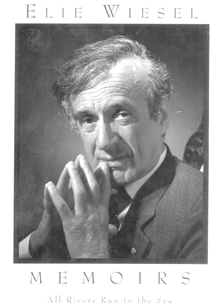

[ Metro SantaCruz | SantaCruz Home | Archives ]
A Life's Journey
By Dan Pulcrano
AFTER COINING the term Holocaust, writing 30 books and winning the Nobel Peace Prize, Elie Wiesel has finally gotten around to penning his memoirs. Wiesel makes it clear right away that All Rivers Run to the Sea (Knopf) is not an autobiography.
He calls it "not the story of my life, but my stories," which is refreshing, for Wiesel is nothing if not a storyteller in the great Hasidic tradition. His childhood stories glow with the warmth of shtetl life--of melon merchants and mystical bearded rabbis--a world that came to an abrupt and tragic end and left Wiesel as the preeminent chronicler of its demise. In a world of fulsome authors and celebrities, it would be too easy to dismiss Wiesel's description of himself as a reluctant autobiographee as little more than glib false modesty. But Wiesel understands the random franchise of human life too well to rest on his laureate.
His work is humbled by the knowledge that it could have just as easily been he who succumbed to the power of evil at Buchenwald, instead of bearing witness to his father's waning moments there. "I was ready to die in his place," Wiesel recalls, and acknowledges some ambivalence about the stellar career that grew out of that defining event.
Wiesel remained true to character even after winning the Nobel Prize. During a visit eight years ago to this area, he described for reporters how winning the Nobel had changed his life: "The difference in my life is I have a secretary. It came, maybe, in my life too late for me to change. I go on teaching exactly the same way. I hardly miss a class. I try to talk less because it's time consuming. The only difference, I think, is that people occasionally listen."
Wiesel's simple decency and uncanny economy of words account for much of his charisma, but even those qualities would have a short tread life on a half-century-long literary journey whose defining theme is Jewish persecution.
He admits he is different than other chroniclers of the genre. His characters aren't "sexually obsessed or pathologically greedy," and, while refusing "to dwell on ugliness and abjection," he has avoided sketching a world of "messianic dreamers and aspiring poets" as well.
WITH STORYTELLER'S grace, Wiesel chronicles the absurdity, human strength and wonder of life under extreme conditions without crossing over into romanticism, like the historically mendacious TV reenactments of death-camp inmates in perfectly starched pajamas, with love-tryst subthemes. Wiesel's ability to confront the abyss without giving us the literary equivalent of archival crematorium footage accounts for his continuing popularity.
He is candid in addressing the thorny questions that could easily be skirted: maintaining faith in the aftermath of God's silence during the destruction of European Jewry, as well as the passiveness of his coreligionists abroad, something many American Jews of his generation would rather not remember:
It was April 1944, just a few weeks before the Allied landing in Normandy, but the Jews of Sighet had not been informed of the ramifications of the Final Solution. The free world, including the Jewish leadership in America and Palestine, had known since 1942, but we knew nothing. Why didn't they warn us? Though this in no way attenuates the guilt of the killers and their accomplices, it is impossible not to feel indignation at the passivity of our brothers and sisters in America and Palestine.
While taking his God and fellow Jews to task (though not rejecting them), Wiesel saves praise for peasants like Maria the housekeeper, who offered his family refuge. "If other Christians had acted like her, the trains rolling towards the unknown would have been less crowded," he speculates.
The book is more than a Holocaust reflection, however, and the post-liberation chapters are more of a traditional career chronicle, with name drops and anecdotes. Although these sections lack the magic and mysticism of his childhood or the emotional depth of the Nazi period, they provide a revealing look at a journey through continents and careers as a journalist, author, professor and celebrity.
More recent events, like the snubbing of President Reagan (who doesn't even make it into the index) after the ex-president's wreath-laying at a Nazi cemetery in Bitburg, or the Palestinian intifada, don't find resolution in this chronicle. On the latter issue, Wiesel can sometimes sound like an apologist for Israel's more militarist tendencies. While not a blind spot, it at least would seem like a soft spot for people who look to Wiesel as a moral compass on modern dilemmas. During his 1988 speech here, Wiesel refused to condemn Israel's pre-treaty policies in the West Bank and Gaza. He did at that time call on Israel to recognize the Palestinians as a people once the PLO renounced terrorism and recognized Israel. And in All Rivers, Wiesel writes that "a Palestinian people ... does exist and it has a right to fulfill its destiny."
Now in his late 60s, Wiesel confronts personal destiny and writes that he awakes drenched with sweat from dreams about his own death. This volume is in part an attempt to reconcile with the spirits of the dead before that inevitable event. He confesses guilt about relatives who died before he got around to purchasing gifts he promised to deliver, about inventing history for Parisian tourists he was assigned to entertain. Even someone who could with only slight exaggeration be described as the conscience of humanity, I guess, has to clear his conscience once in a while.
[ Metro Santa Cruz | SantaCruz Home | Archives ] This page was designed and created by the Boulevards team.

Elie Wiesel tells his own story at last
Elie Wiesel speaks May 7 at 7:30pm at the Santa Cruz Civic, 307 Church St. Tickets are $12.60-$37.80. (408/459-2159)
From the May 2-8, 1996 issue of Metro's Literary Quarterly
Copyright © 1996 Metro Publishing and Virtual Valley, Inc.